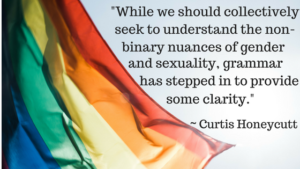NSNC Member
 June is LGBT Pride Month, commemorating the 1969 Stonewall riots in Manhattan. Since then, the U.S. cultural understanding of LGBT rights has progressed considerably, although we’ve still got a long way to go (which is akin to saying hammerhead sharks have more to learn about rules of the road before they’ll be issued driver’s licenses).
June is LGBT Pride Month, commemorating the 1969 Stonewall riots in Manhattan. Since then, the U.S. cultural understanding of LGBT rights has progressed considerably, although we’ve still got a long way to go (which is akin to saying hammerhead sharks have more to learn about rules of the road before they’ll be issued driver’s licenses).And while we should collectively seek to understand the non-binary nuances of gender and sexuality, grammar has stepped in to provide some clarity (thanks, grammar). For instance, last year the AP Stylebook made a significant rule change, adding “they” as an acceptable singular pronoun. According to the AP, “They/them/their is acceptable in limited cases as a singular and-or gender-neutral pronoun, when alternative wording is overly awkward or clumsy. However, rewording usually is possible and always is preferable.”
Up until now, I’ve been against using “they” as an acceptable singular pronoun, as it’s often used as a grammar mistake. Take, for example, Fergie’s 2006 hit “Big Girls Don’t Cry” in which the artist sings “And I’m gonna miss you like a child misses their blanket.” Every time I heard this song on the radio, I’d judge Fergie (or whoever wrote the song) for his/her/their incorrect pronoun usage. I suppose I expected the solo Black Eyed Peas careers to incorporate better grammar into their lyrics. Either way, I like making the “they/them/their” exception when it comes to issues of gender inclusivity.
According to the AP, clarity is key here, primarily because the word “they” has always served strictly as a plural pronoun, or so I thought. Apparently using the singular “they” as a non-binary pronoun has been in use since the thirteenth century. Over the years, writers including Shakespeare, Dickens, Austen, and Shaw have used “they” as a singular pronoun.
But as newer, experimental gender-neutral pronouns including “xe” and “ze” haven’t yet gained popular adoption or garnered widespread awareness, “they” is acceptable, as long as it’s clear to whom the writer is referring. When possible, GLAAD points out , it makes sense to use the subject’s name for clarity purposes, although that can quickly become redundant.
Just as we need to develop a better understanding of gender-inclusive pronouns, we need to make sure we’re becoming increasingly pro-people. I know issues of gender and sexuality are touchy subjects. However, as culture and language drive each other forward, rules change. Usage shifts. People gain understanding. And regardless of what gender a person identifies as, everyone deserves to be treated with dignity and respect – these are our inalienable rights.
***
 Curtis Honeycutt is a nationally syndicated humor columnist. Connect with him on Twitter (@curtishoneycutt) or at curtishoneycutt.com.
Curtis Honeycutt is a nationally syndicated humor columnist. Connect with him on Twitter (@curtishoneycutt) or at curtishoneycutt.com.
